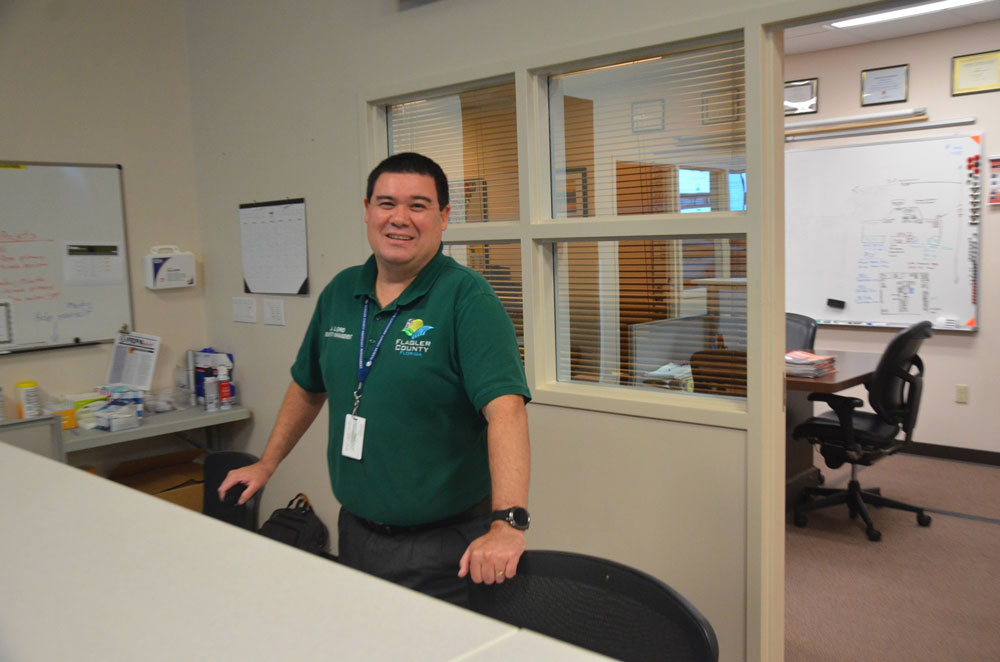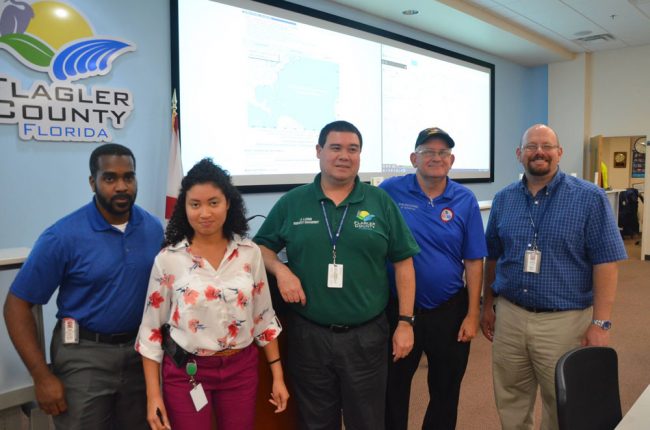
Download your 2021 Disaster Preparedness Guide here.
Just as the covid pandemic crisis that’s kept Jonathan Lord’s Emergency Operations Center in a state of emergency for well over a year is finally winding down, here comes hurricane season–and Bob Pickering, emergency management’s weather guru, predicting from back of the room in his siren-like voice that “we’re due for a break.”
“Statistically,” says Pickering, who has a Kardashian-like following and the kind of memory that could probably tell you what size hail fell on a given day 17 years ago, and on what side of State Road 100, “if you look at how many times we’ve been hit, you know we’re due for a break. Because 1999, we got whacked a few times. Then nothing until 2004, then we’ve had 2016, 2017, Durian [in 2019], so statistically, mathematically, we’re due for a break.”
You can tell it’s not the sort of thing Lord wants to hear–not as a prediction, anyway. He stood at the podium, fidgeted, laughed that nervous laugh that says please don’t go on. He tries to cut off Pickering: “I will not secure my continued employment on statistics. Statistically we’re due a break…” Lord says, but Pickering goes on, now himself warning that predictions of the sport aren’t a good idea: just look at what happened in Pensacola. “Pensacola said, Oh, we don’t get hurricanes here. We haven’t had a hurricane here in 50 years, and in 1995, we had two.”
That’s more to Lord’s liking. “I guarantee you, there were hundreds of thousands if not millions of people that said Category 5’s don’t come to the Panhandle and swore by that statement,” Lord says. “It only takes one. Trust me. I’m not wishing one on this community. I’m not wishing a Category 1 on this community. I’m Okay, proudly saying at the end of the season, if we did not have to activate the EOC once, I am okay with that. But–I need to be ready that we have to do it. Our whole community needs to be ready that we have to do that.”
That’s what he was doing Tuesday afternoon, giving reporters a lengthy briefing at the EOC on the coming hurricane season–preparation, outlook, covid and shelters, evacuation zones–and doing so in his trademark combination of zen-like calm and complete mastery of his gear-shifting subjects: it wasn’t long ago that, along with Health Department Chief Bob Snyder, Lord was navigating the county through the pandemic emergency, coordinating messaging, testing drives, vaccine drives, only to now shift into hurricane mode (he is planning to ask the county commission next week to end the declaration of emergency related to covid.) By way of a segue, he gives a nod to the kind of statistics and calendar brackets Lord would rather not talk about, like the fact that hurricane season has a set date of June 1 to November 30.
It doesn’t quite work that way, Lord says. There’s hurricanes and tropical storms that fall outside the season. The brackets heighten residents’ awareness for the statistically likelier period when hurricanes hit: 96 percent of them do so during those months, with an actual peak around Sept. 10. Conversely, the brackets could lower residents’ preparedness outside the season. Lord prefers to think of preparedness as disaster preparedness, 365 days a year. If it’s not for hurricanes, it can be for tornadoes or wildfires, which happen in spring–wildfires triggered a countywide evacuation two decades ago–or flooding emergencies.
Flagler County and Palm Coast have had all those emergencies in the past decade–the December tornado that ripped through Palm Coast’s B-Section in 2013, the wildfires of 2011, the Flagler Beach flood in the wake of Hurricane Irma, and of course the hurricanes themselves–Isaias in 2020, with very limited impacts, Dorian in 2019, Irma in 2017, Matthew in 2016, the latter two devastating the coastline and requiring what became a $25 million rebuild of the county’s dune system, and an equally expensive reconstruction of the southern portion of State Road A1A in Flagler Beach. The dunes protect A1A and the communities behind it from flooding, as long as the water doesn’t surge from the Intracoastal, as it did during Irma.
The dune system “has been chipped away over the last couple of years, whether it was Dorian or nor’easters or other just heavy, heavy surf events have chipped away at the dune system,” Lord said, “but the system is still there.” Sea level rise combined with even severe but not necessarily tropical storms have been causing slow but relentless damage. But the system is still solid enough to be protective, Lord said. The “dune systems are effective, they are meant to be sacrificial, the whole idea is they’re there to take the damage, take the blows, and therefore what’s behind it stays protected,” he said. “That is the whole intent of the dune system. You hope they don’t have a ton of blows. And that way the dune system stays intact for many, many years to come. But at the end of the day, that sand will be taken away in a large storm. But it’s better to take that away than the properties and potentially the lives on the other side of that dune system.”
Emergency management has moved away from broad-based evacuations. “In our role we call it shadow evacuations–the evacuation of those that don’t need to evacuate,” Lord says. The directive for most is to shelter in place rather than clog up roads or needlessly seek shelter. So evacuations in emergencies are now more targeted. Typically in Flagler, evacuations will first affect the barrier island, then shift west depending on the severity of the storm, though when it comes to mobile or manufactured homes, those are still among the highest priorities to evacuate regardless of location.
“So if we only order evacuation of Zone A, which is the barrier island primarily, if you’re in any of the other evacuations that are not under order, and unless you know that your home floods every time–and there are some homes on the Intercoastal that readily flood–we really would rather you stay in your home or stay with family members,” Lord said. “Let the shelter be there for folks that truly do not have a plan in place, can’t go somewhere else.”
Nevertheless, evacuations may well be ordered, even if, in retrospect, they may miss the mark.
“Dorian did not come here,” Lord said. “We told people to evacuate. And I got emails. ‘I lost money in my business because we closed down because you told me to evacuate.’ ‘I left my home and had to get a hotel room because you told me to evacuate.’ I get those every time that evacuation decision is made. I get loving emails telling me why we should not have done that. And I get it. We use the best science, which is the Hurricane Center to tell us where they believe the storm is coming. And if they believe it’s coming here, and the science tells us as the odds are it’s coming here, then we are going to order that evacuation. I am okay being told that I shouldn’t have done that after the fact. It is much better than me being told I should have evacuated and people die. I do not want that to happen ever in this county, deftly not while I’m here. But never in this community. I don’t want people risking their lives when they could have been somewhere safe.”
You can see evacuation zones here. You can check which evacuation zone you’re in here or here. The zones are periodically adjusted, but no changes are expected this year. “Tweaks” are expected next year, Lord said. “Take that minute now and find out today if you’re in that evacuation zone.”
The pandemic has been its own kind of disaster. “It has not gone away. It’s is still here,” Lord cautions. “However, this community has done quite well, even though our vaccines or vaccinations have slowed down quite a bit. But we are still going to take some precautions in our shelters. We’re also going to increase spacing between our evacuees in the shelters.”
The county has plenty of masks, gloves, hand sanitizers all stockpiled specifically for hurricane season. Masks will be recommended, but not required, inside shelters, should the county open them during a hurricane emergency. But wandering through the shelter will not be allowed. “It’ll be a little bit more restrictive,” Lord said. Half the county’s residents are vaccinated. More will be as the season wears on. “If someone does show up and self identifies as having Covid-19 or is symptomatic upon arrival, we will have a separate area for those people separate from the general the main population in the shelter. That way we can protect as many people as possible.”
Staying current with AlertFlagler, the free alert system residents can participate in for emergency notifications through email, phones or other means, is highly recommended. With thousands of new residents moving in every year, many may not be aware of AlertFlagler’s availability. Adding home flood insurance is recommended whether you are in a flood zone or not: it’s inexpensive when you’re not. “Just like hurricanes happen outside hurricane season, floods happen outside of flood zones,” Lord says.
Lord gave his 90-minute briefing in a conference room, but then walked through the actual nerve center of the Emergency Operations Center–the vast room with a place for every government, public safety, community, utility and other officials who teem around the EOC during an emergency, coordinating the event to ensure that damage is contained as much as possible and issues addressed as efficiently and safely as possible. That’s the operation Lord oversees, when it is in full emergency mode.
The room was empty on Tuesday, but for Lord and his five staffers–Senior Emergency Management Planner Ryan Simpson, Planners Nealon Joseph and Tiffany Islam, and of course Emergency Management Specialist Bob “BP” Pickering. It’s the sort of room that may well be at its best when busy, but that is best when never needed.
If and when it is, Lord wants the community to know that it’s a Cat-5 resistant bunker in engineering only. Otherwise, he wants it to be a glass house, its work transparent and readily accessible, or at least communicated, its intentions single-minded for the community’s safety.
“I’d like to definitely reassure all our residents and businesses that the county is prepared,” Lord says. “We are watching, we’re on the ball. We’re ready to deal with it. Every hurricane is going to be different, we know that and we can’t predict everything. I’d love to, but I can’t. But we are prepared to deal with whatever’s thrown our way. We will have the right players at the EOC to take care of our community to help troubleshoot whatever pops up. To me, the number one thing is communications for us. In a disaster the EOC can’t be a little siloed room with no information. It’s not just information-sharing between all the players who come in there. But if our residents don’t know what we’re doing, then we’re not doing our jobs, either. We need to constantly communicate with our residents.”
![]()































Skibum says
Kudos to our emergency operations center staff here in Flagler County. I believe they do an excellent job for all of us who live here locally. I’ve been to the EOC and have taken the National Weather Service’s Skywarn Storm Spotter class at our EOC, and I am impressed with our local staff’s knowledge and expertise in planning for any type of emergency we may face. It is much better to be prepared and not need to activate our county’s emergency plan than to be unprepared and need resources that are not in place.